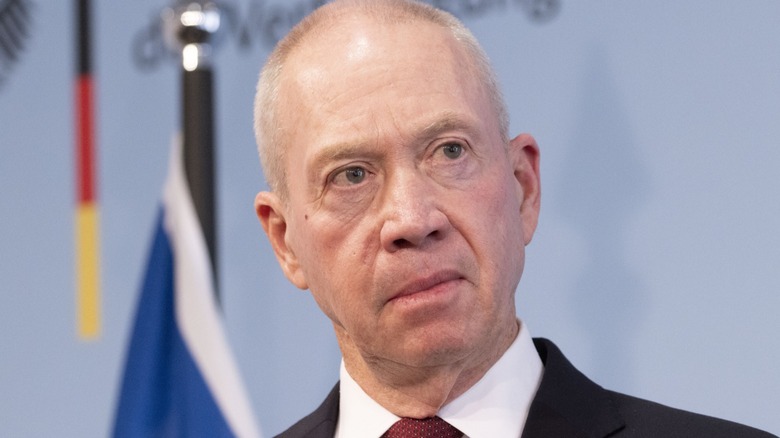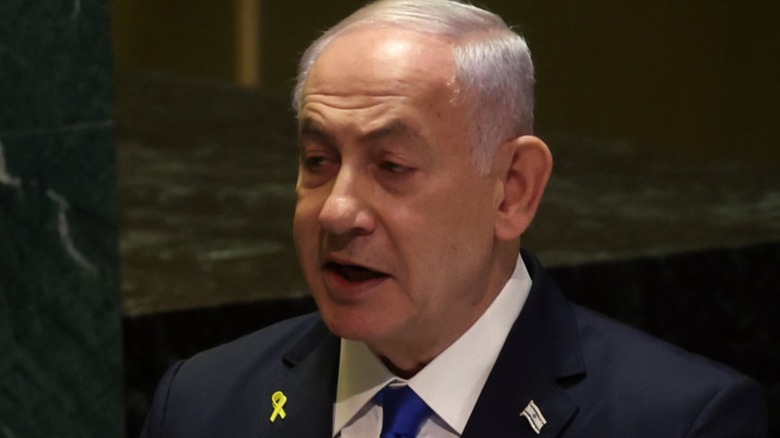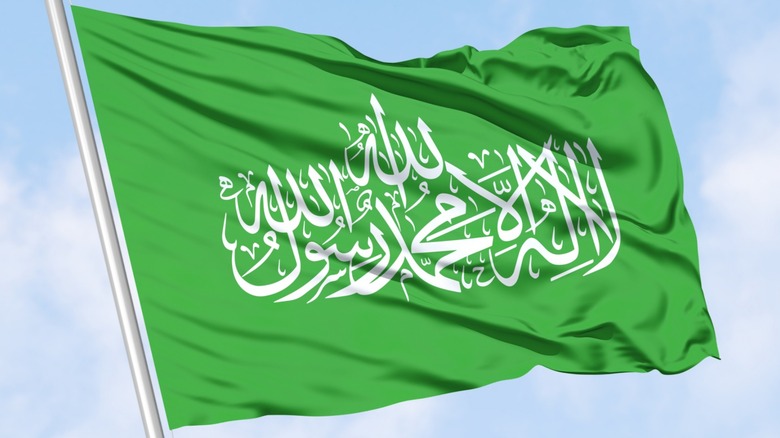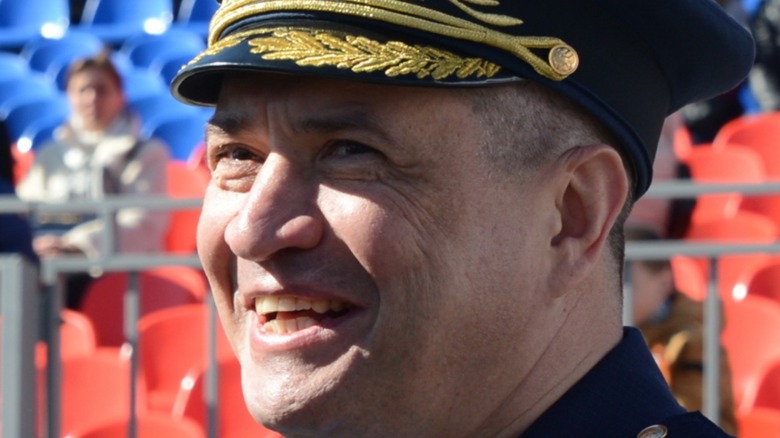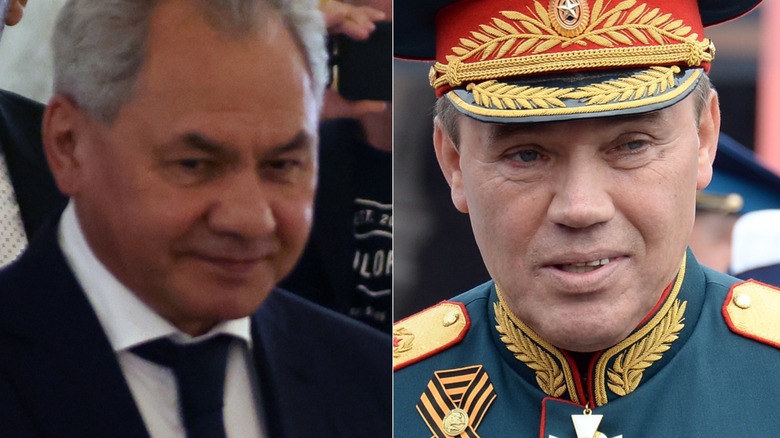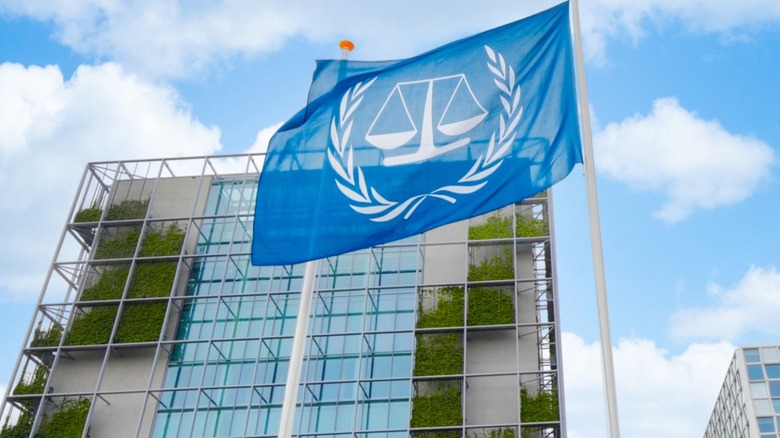The ICC's Most Notable Arrest Warrants Of 2024
Not so much a law enforcement agency as a watchdog for the world, the International Criminal Court (ICC) launches investigations into and issues warrants against those it accuses of committing the most heinous acts imaginable. The tribunal watches out for global-scale offenses including war crimes, genocide, criminal aggression, and crimes against humanity. Affiliated with the United Nations, the international peacekeeping and diplomacy body, the ICC has sent out 59 warrants over its history, calling for the arrest of some of the world's most powerful leaders and political operatives and most notorious terrorists and warlords. It's hosted more than 30 criminal trials, and around 30 defendants remain at large, their outstanding warrants going back almost two decades.
When the ICC issues an arrest warrant, it's a rare act. But 2024 has been one of the organization's busiest years on record. Before the year was out, the ICC told the world community that it was looking to arrest and try three men, all of whom allegedly played a prominent role in the ongoing Israeli-Palestinian conflict. Here's who got added to the International Criminal Court's most wanted list in 2024.
Benjamin Netanyahu and Yoav Gallant of Israel
The International Criminal Court released all three of its warrants for 2024 simultaneously. On November 21, the body called for the arrest of three figures involved in the year-long war between Israel and Hamas, the militant political organization associated with Palestine. Two of the wanted individuals are high-ranking members of the Israeli government: Prime Minister Benjamin Netanyahu and now former defense minister Yoav Gallant. According to a statement by the ICC, judges cited "reasonable grounds to believe" that Netanyahu and Gallant "intentionally and knowingly deprived the civilian population in Gaza of objects indispensable to their survival."
Among the necessities allegedly denied to Palestinian people: food, water, medicine, fuel, and electrical services. The deprivation purportedly took place over a period lasting from October 8, 2023 (the day the conflict began when Hamas attacked Israel) until at least May 20, 2024, the day that the ICC's chief prosecutor first proposed the arrest warrants. Per the tribunal, Netanyahu and Gallant reportedly violated international law with regard to humanitarian aid. The leaders alleged actions are said to have affected municipal services like water and dangerously hindered the operation of hospitals treating the war wounded.
Mohammed Deif of Hamas
The third person facing an arrest warrant from the ICC in 2024: Mohammed Diab Ibrahim Al-Masri, commonly known as Mohammed Deif. One of the most powerful people in the Hamas organization, he served as the top commander in al-Qassam Brigades, the Palestinian nationalist group's military branch. While the ICC warrants calling for the arrests of Israeli officials Benjamin Netanyahu and Yoav Gallant are for their retaliatory actions in the war with Hamas dating to October 2023, Deif's is for a different set of offenses. The ICC means to arrest and try Deif for crimes against humanity — specifically murder, extermination, torture, rape, and sexual violence — as well as war crimes.
The court believes Deif to be liable for authorizing and participating in the military activities that started the war, an attack on Israel that resulted in the deaths of 1,200 civilians and 250 people abducted as hostages. Deif, however, might not be alive. According to the Israeli military, he died in a strike in July 2024.
Sergei Kobylash and Viktor Sokolov
The International Criminal Court's first warrants issued in 2024 went active in March and called for the arrest of Sergei Kobylash and Viktor Sokolov. The ICC has accused both men — high-ranking members of Russia's military — of crimes committed between October 2022 and March 2023, and potentially beyond. All relate to the Russian invasion and aggression against Ukraine that began in February 2022. Kobylash is a lieutenant-general in the Russian Armed Forces, and at one point during the period analyzed by the ICC, he was the commander of the Long-Range Aviation of the Aerospace Force. Sokolov is an admiral in the Russian naval force, and during the same time frame, he was the commander of the Black Sea Fleet.
Kobylash and Sokolov are jointly accused of orchestrating attacks on civilian areas of Ukraine, a war crime, and various inhumane acts. The crux of the ICC's case revolves around Russian military-led attacks on power plants and electrical substations in Ukraine. The ICC's foundational document, the Rome Statute, requires the agency to prosecute acts intended to "intentionally [cause] great suffering, or serious injury to body or to mental and physical health." The crimes purportedly committed by Kobylash and Sokolov affected the lives, property, and overall well-being of the people of Ukraine. It took the court two years of investigation before it officially issued the warrants, and they followed a call to arrest Russian government leader Vladimir Putin for war crimes and crimes against humanity related to the Ukraine-Russian conflict.
Sergei Shoigu and Valery Gerasimov
Following its announcement of arrest warrants of two military figures allegedly complicit in crimes committed during the Russian occupation of Ukraine, the International Criminal Court announced that it also wanted to try two even higher-ranking officials. In June 2024, the ICC released warrants for Sergei Shoigu and Valery Gerasimov. Shoigu is the former defense minister of the Russian Federation, while Gerasimov is the chief of the general staff of the Russian Federation and a deputy defense minister who served under Shoigu.
The ICC accused the two government-level military leaders for acts committed between October 2022 and March 2023, and, it's presumed, after that. Per an ICC investigation, Shoigu and Gerasimov reportedly committed the war crime of causing excessive incidental harm to non-military personnel and property in Ukraine, as well as the crime against humanity of inhumane acts. The ICC wishes to hold the two ministers accountable for Russian missile attacks that targeted electric infrastructure facilities throughout Ukraine.
Russia isn't a signatory to the ICC's code of laws, so it's unlikely that law enforcement in that country will seek out and arrest Shoigu or Gerasimov. After the arrest warrants issued for Sergei Kobylash and Viktor Sokolov earlier in 2024, the Kremlin released a statement announcing as much. "We are not parties to the statute — we do not recognize this," Russian government spokesperson Dmitry Peskov told reporters (via Reuters).
Charged parties responded to the warrants
In response to the ICC's warrants against him and former defense minister Yoav Gallant, Benjamin Netanyahu released a statement dismissing the allegations and justifying his administration's actions. "Israel rejects with disgust the absurd and false actions and charges against it by the International Criminal Court, which is a biased and discriminatory political body," Netanyahu's office said (via The Guardian). "There is nothing more just than the war that Israel has been waging in Gaza since the seventh of October 2023, after the terrorist organization Hamas launched a murderous attack against it, and carried out the greatest massacre committed against the Jewish people since the Holocaust."
In his own statement, Yoav Gallant decried the warrants. "The decision sets a dangerous precedent against the right to self-defense and moral warfare and encourages murderous terrorism," he said (via CBS News). Hamas responded on behalf of military leader Mohammed Deif, calling the warrants "an important step towards justice for the Palestinian cause." Not acknowledging the call to arrest Deif, the statement continued, "A message must be sent to every war criminal that he will not escape punishment."
As for what happens now, the ICC doesn't operate its own police force, so U.N. member nations and court signatories are beholden to enforce rulings. All of the accused could all theoretically be arrested if they traveled to any of those countries — which doesn't include Israel or the U.S., who haven't signed off on the ICC's ground rules laid out in the Rome Statute.
